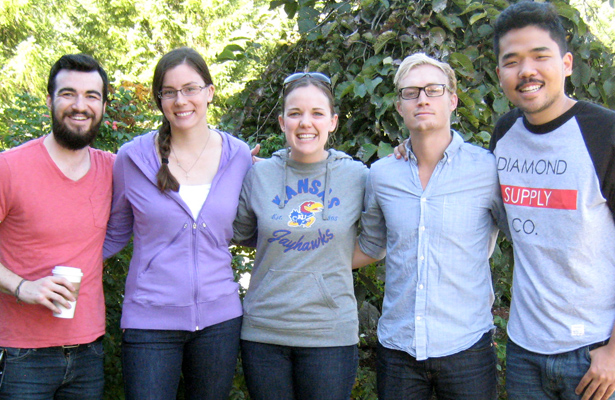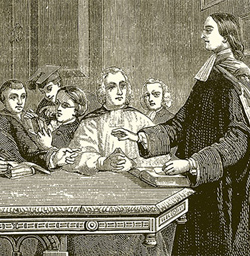The Bible & Theology Toward Christian Maturity
Seminary Students Lead Undergraduates in Wesleyan Small Groups
“How Goes It With Your Soul?”
By Kelsey Chase
 Murdock Discipleship Fellows Program Administrator Kelsey Rorem (center) with Seminary students (left to right) Brady Rector, Erica Cox, Jake Carlson, and Dae Shik Kim.
Murdock Discipleship Fellows Program Administrator Kelsey Rorem (center) with Seminary students (left to right) Brady Rector, Erica Cox, Jake Carlson, and Dae Shik Kim.
While still a student, John Wesley met with his brother Charles and others at the University of Oxford to ask each other one question: “How goes it with your soul?”
At Seattle Pacific University, seminary and undergraduate students are asking each other the same thing in hour-long meetings once a week. Thanks to a 2014 Vision and Call Grant from the Murdock Charitable Trust, the School of Theology has established a multi-tiered discipleship program of Wesleyan small groups in University Foundations 1000 courses.
“There are a lot of vibrant opportunities for students to plug in on campus, but nothing else like this,” says Kelsey Rorem, program advisor for the Murdock Discipleship Fellows in the Center for Biblical and Theological Education. “So much of church and school is content-heavy, and this is a breath of fresh air.”
Four first-year Seattle Pacific Seminary students facilitate groups led by junior and senior undergrads in UFDN 1000 classes, mentor those same leaders in their own small group, and attend one-on-one care sessions with Rorem and lectures from professionals. They also receive tuition support and a stipend through the Murdock grant.
For seminarian Erica Cox, leading the groups balances the academic side of seminary with on-the-ground ministry. It’s also helped her discern whether she’s called to youth or adult ministry.
“The way life is in college lends itself to not thinking about your soul,” she says. “Looking back, I realize I never took the time to sit down and think about that question.”
During group meetings, students in select UFDN 1000 classes talk about where they see God working in their lives, how they are growing or changing, and the things that brought them joy or were challenging.
 A small group at Oxford University known as the “Holy Club,” including John and Charles
Wesley, was the earliest gathering of what would become Methodism. (Private Collection/Look and Learn/Bridgeman Images)
A small group at Oxford University known as the “Holy Club,” including John and Charles
Wesley, was the earliest gathering of what would become Methodism. (Private Collection/Look and Learn/Bridgeman Images)
“In Wesley’s era, the groups met together as people seeking God,” says Doug Strong, dean of the School of Theology. “You didn’t have to be a Christian, just seeking.”
The same is true at SPU. Regardless of where students are in their spiritual journey, they learn to listen and ask questions rather than offer advice. On course evaluations, Wesleyan small groups are regularly ranked as the aspect of the course students liked best.
“It felt like the University was reaching out to me,” says junior Ben Purcell, who participated in a Wesleyan small group as a freshman and now leads one. “The small group made SPU feel like a home.”
For Strong, the University’s multi-tiered discipleship program honors its Wesleyan heritage. B.T. Roberts, founder of the Free Methodist denomination, was committed to the importance of small groups.
“Roberts came here in 1891, saw the land, and said this is where we’ll be,” Strong says. “Wesley small groups are part of our DNA. They help us become who we are.”
